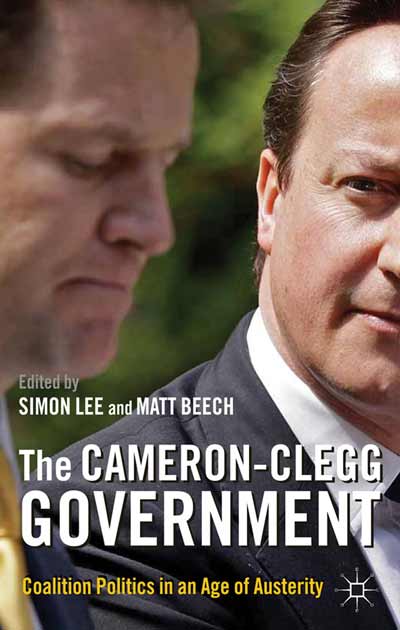 Steve Coulter delves into the latest title on the coalition’s ramshackle marriage of convenience, finding a useful book for students and general readers.
Steve Coulter delves into the latest title on the coalition’s ramshackle marriage of convenience, finding a useful book for students and general readers.

The Con-Dem coalition – Britain’s first in peacetime in 100 years – has quickly thrown up a series of intractable dilemmas.
First, can David Cameron’s ‘Big Society’ expand the boundaries of civil society fast enough to compensate for the rapid withdrawal of the state mandated by his Chancellor’s public spending cuts?
And second, can the coalition itself reconcile ideological conflicts along a number of dimensions? Not just the obvious Conservative/Liberal Democrat divide, but equally significant internal schisms between authoritarian and libertarian Conservatism on one hand, and ‘Orange book’ economic liberals and social democrats within their coalition partners.
 The Cameron-Clegg Government, by two Hull University academics, Simon Lee and Matt Beech, analyses how these fractures have been addressed during the coalition’s first year in power. The book’s 17 chapters by different specialists assess the daunting challenges faced by the two leaders in holding together what seems like an increasingly ramshackle marriage of inconvenience.
The Cameron-Clegg Government, by two Hull University academics, Simon Lee and Matt Beech, analyses how these fractures have been addressed during the coalition’s first year in power. The book’s 17 chapters by different specialists assess the daunting challenges faced by the two leaders in holding together what seems like an increasingly ramshackle marriage of inconvenience.
The bulk of these deal briskly and efficiently with key policy areas – the economy, NHS, Europe, diplomacy etc. Other chapters look vainly for signs of compatibility between core Conservative and Lib-Dem philosophies. Many find a surprising degree of continuity with New Labour.
The contradictions of coalition policies are everywhere laid bare. For example, the grandly titled Strategic Defence and Security Review, hastily cobbled together before the spending review to give the illusion of policy being made independently of financial constraints, is derided as an exercise in recognising only as many threats as the shrivelled defence budget can afford.
On Home Affairs, to take another example, the coalition’s approach has parted company from traditional Tory authoritarianism (even though the Home Office and Department of Justice are stuffed with Conservative Ministers). This lays it open to backbench Tory unrest, as well as Labour’s opportunistic courting of Sun-readers in Tory marginals, while ultimately doing little for coalition cohesion.
There are some obvious drawbacks with this kind of book. Can the flavour and trajectory of a political regime really be gauged after only 12 months in office, before ‘events’ have had a chance to pile up?
The phrase “of course it may be too early to tell, but…” crops up a lot in the book. In terms of data, there’s a lot of reliance on instant think tank analysis and preliminary performance indicators, likely to be revised in future.
Simon Lee’s chapter on the economy, for example, castigates George Osborne’s obsession with slashing the welfare bill while ignoring the trillion pound bailout of the City. Yet recent estimates by the Audit Commission and the Office for Budgetary Responsibility now put the net cost of this at a few billion at most. Many analysts expect the Treasury to make a tidy profit when it sells its stakes in RBS and Lloyds.
In the environment chapter, James Connelly mentions divisive plans to part-privatise the nation’s forests. But this has now been reversed, in what was one of the first of many policy u-turns.
On the other hand, there’s nothing wrong with an end of year progress report – by any account the coalition has been exceptionally energetic. The well-researched policy sections are bookended by thoughtful chapters on the construction of modern liberalism, which furnish grounds for continued collaboration between the genuinely ‘liberal’ wings of each party.
And what of Labour? A lasting legacy of the coalition, says Kevin Hickson, may be to end the schism between its ‘Old’ and ‘New’ factions. The prospect of years of austerity may provide the party with the political space to de-emphasise the Blairite trade-off between economic prosperity and social democracy. Cameron and Clegg’s pain may be well ultimately be Ed Miliband’s gain, if he has the confidence to seize it.
The likely short shelf-life of this book should not detract from its immediate value as a timely rain-check on the government’s progress. The coalition may well have a lot longer to run, but its first year has certainly been action packed and students of British politics will find much to chew over in this volume.
——————————————————————————————-
Steve Coulter is Senior Economics and Business Analyst for BBC News, and writes regularly for the BBC News website on UK economic policy. He is also an Associate Fellow of the Social Market Foundation think tank and wrote the SMF’s recent paper on industrial policy, Manufacturing Prosperity. He is currently working on a project on the media’s coverage of the financial crisis with the Journalism School of City University. Steve received his PhD in European Political Economy from the LSE’s European Institute.







